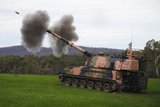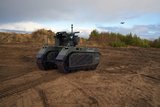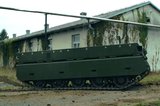Raytheon to improve US Army’s TOW missile
Raytheon has received a $21 million contract from the US Army to develop a new propulsion system for its TOW missile, the company announced on 7 October.
The contract funds a three-year effort to make performance improvements to the tube-launched, optically tracked TOW missile. Performance improvements will be integrated into all TOW missile variants, including the top and direct attack 2B, direct attack 2A and Bunker Buster missiles.
The radio frequency-guided TOW missile is a long-range, heavy assault-precision anti-armour, anti-fortification and anti-amphibious landing weapon system that enables ground forces to achieve better capability against adversary armoured and wheeled systems, regardless of the environment or conditions.
Kim Ernzen, VP, land warfare systems, Raytheon, said: ‘Improving TOW's propulsion system will increase range and deliver enhanced protection for ground troops while providing them with more capability. Raytheon and the army have consistently upgraded the TOW weapon system to keep it relevant for today's fight and help our soldiers preserve their overmatch advantage on the battlefield.’
More from Land Warfare
-
![Active vehicle protection comes to the forefront as Trophy and Iron Fist secure contracts]()
Active vehicle protection comes to the forefront as Trophy and Iron Fist secure contracts
Experience on the battlefield is accelerating the adoption of active protection systems as technologies continue to evolve to reflect shifting global defence needs.
-
![World Defense Show 2026: Hanwha increases Middle East presence and reveals Tigon 6x6 sale]()
World Defense Show 2026: Hanwha increases Middle East presence and reveals Tigon 6x6 sale
Shephard sat down with Hanwha Middle East and Africa president Sung Il at World Defense Show 2026 to hear about the company’s plans for the region and how it plans to use local industry success to win deals.
-
![Estonia builds Asia-Pacific links as it looks to scale defence industry capabilities]()
Estonia builds Asia-Pacific links as it looks to scale defence industry capabilities
Collaboration between Estonian defence companies and well-aligned firms in Asia-Pacific will form a key part of Tallinn’s ambitions to significantly grow its defence industrial base.
-
![World Defense Show 2026: DOK-ING working on MV-8 variants and reveals specs ahead of Eurosatory]()
World Defense Show 2026: DOK-ING working on MV-8 variants and reveals specs ahead of Eurosatory
The Croatian company began the development of the MV-8 modular uncrewed platform in the early 2020s. Specifications for the vehicle were revealed to Shephard at World Defense Show 2026.
-
![World Defense Show 2026: Turkish and European industries will cooperate, says Aselsan boss]()
World Defense Show 2026: Turkish and European industries will cooperate, says Aselsan boss
Aselsan was formed 50 years ago in response to difficulties Turkey was facing in sourcing major systems internationally. While some challenges still remain, company president Ahmet Akyol believes a rapprochement is possible.























